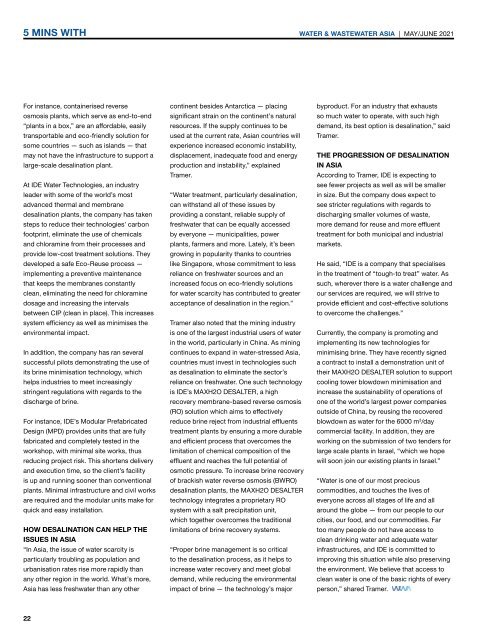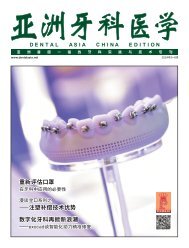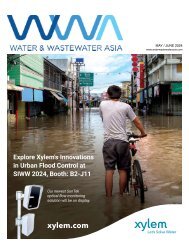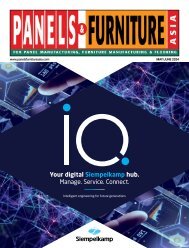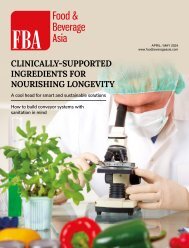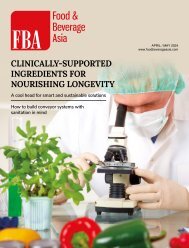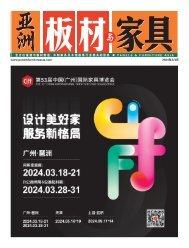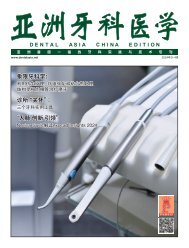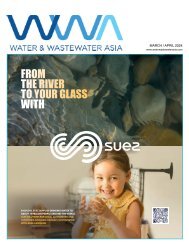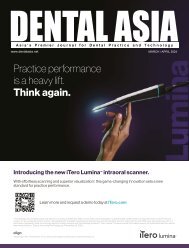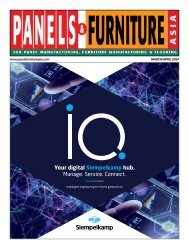Water & Wastewater Asia May/Jun 2021
Water & Wastewater Asia is an expert source of industry information, cementing its position as an indispensable tool for trade professionals in the water and wastewater industry. As the most reliable publication in the region, industry experts turn this premium journal for credible journalism and exclusive insight provided by fellow industry professionals. Water & Wastewater Asia incorporates the official newsletter of the Singapore Water Association (SWA).
Water & Wastewater Asia is an expert source of industry information, cementing its position as an indispensable tool for trade professionals in the water and wastewater industry. As the most reliable publication in the region, industry experts turn this premium journal for credible journalism and exclusive insight provided by fellow industry professionals. Water & Wastewater Asia incorporates the official newsletter of the Singapore Water Association (SWA).
Create successful ePaper yourself
Turn your PDF publications into a flip-book with our unique Google optimized e-Paper software.
5 MINS WITH WATER & WASTEWATER ASIA | MAY/JUNE <strong>2021</strong><br />
For instance, containerised reverse<br />
osmosis plants, which serve as end-to-end<br />
“plants in a box,” are an affordable, easily<br />
transportable and eco-friendly solution for<br />
some countries — such as islands — that<br />
may not have the infrastructure to support a<br />
large-scale desalination plant.<br />
At IDE <strong>Water</strong> Technologies, an industry<br />
leader with some of the world’s most<br />
advanced thermal and membrane<br />
desalination plants, the company has taken<br />
steps to reduce their technologies’ carbon<br />
footprint, eliminate the use of chemicals<br />
and chloramine from their processes and<br />
provide low-cost treatment solutions. They<br />
developed a safe Eco-Reuse process —<br />
implementing a preventive maintenance<br />
that keeps the membranes constantly<br />
clean, eliminating the need for chloramine<br />
dosage and increasing the intervals<br />
between CIP (clean in place). This increases<br />
system efficiency as well as minimises the<br />
environmental impact.<br />
In addition, the company has ran several<br />
successful pilots demonstrating the use of<br />
its brine minimisation technology, which<br />
helps industries to meet increasingly<br />
stringent regulations with regards to the<br />
discharge of brine.<br />
For instance, IDE’s Modular Prefabricated<br />
Design (MPD) provides units that are fully<br />
fabricated and completely tested in the<br />
workshop, with minimal site works, thus<br />
reducing project risk. This shortens delivery<br />
and execution time, so the client’s facility<br />
is up and running sooner than conventional<br />
plants. Minimal infrastructure and civil works<br />
are required and the modular units make for<br />
quick and easy installation.<br />
HOW DESALINATION CAN HELP THE<br />
ISSUES IN ASIA<br />
“In <strong>Asia</strong>, the issue of water scarcity is<br />
particularly troubling as population and<br />
urbanisation rates rise more rapidly than<br />
any other region in the world. What’s more,<br />
<strong>Asia</strong> has less freshwater than any other<br />
continent besides Antarctica — placing<br />
significant strain on the continent’s natural<br />
resources. If the supply continues to be<br />
used at the current rate, <strong>Asia</strong>n countries will<br />
experience increased economic instability,<br />
displacement, inadequate food and energy<br />
production and instability,” explained<br />
Tramer.<br />
“<strong>Water</strong> treatment, particularly desalination,<br />
can withstand all of these issues by<br />
providing a constant, reliable supply of<br />
freshwater that can be equally accessed<br />
by everyone — municipalities, power<br />
plants, farmers and more. Lately, it’s been<br />
growing in popularity thanks to countries<br />
like Singapore, whose commitment to less<br />
reliance on freshwater sources and an<br />
increased focus on eco-friendly solutions<br />
for water scarcity has contributed to greater<br />
acceptance of desalination in the region.”<br />
Tramer also noted that the mining industry<br />
is one of the largest industrial users of water<br />
in the world, particularly in China. As mining<br />
continues to expand in water-stressed <strong>Asia</strong>,<br />
countries must invest in technologies such<br />
as desalination to eliminate the sector’s<br />
reliance on freshwater. One such technology<br />
is IDE’s MAXH2O DESALTER, a high<br />
recovery membrane-based reverse osmosis<br />
(RO) solution which aims to effectively<br />
reduce brine reject from industrial effluents<br />
treatment plants by ensuring a more durable<br />
and efficient process that overcomes the<br />
limitation of chemical composition of the<br />
effluent and reaches the full potential of<br />
osmotic pressure. To increase brine recovery<br />
of brackish water reverse osmosis (BWRO)<br />
desalination plants, the MAXH2O DESALTER<br />
technology integrates a proprietary RO<br />
system with a salt precipitation unit,<br />
which together overcomes the traditional<br />
limitations of brine recovery systems.<br />
“Proper brine management is so critical<br />
to the desalination process, as it helps to<br />
increase water recovery and meet global<br />
demand, while reducing the environmental<br />
impact of brine — the technology’s major<br />
byproduct. For an industry that exhausts<br />
so much water to operate, with such high<br />
demand, its best option is desalination,” said<br />
Tramer.<br />
THE PROGRESSION OF DESALINATION<br />
IN ASIA<br />
According to Tramer, IDE is expecting to<br />
see fewer projects as well as will be smaller<br />
in size. But the company does expect to<br />
see stricter regulations with regards to<br />
discharging smaller volumes of waste,<br />
more demand for reuse and more effluent<br />
treatment for both municipal and industrial<br />
markets.<br />
He said, “IDE is a company that specialises<br />
in the treatment of “tough-to treat” water. As<br />
such, wherever there is a water challenge and<br />
our services are required, we will strive to<br />
provide efficient and cost-effective solutions<br />
to overcome the challenges.”<br />
Currently, the company is promoting and<br />
implementing its new technologies for<br />
minimising brine. They have recently signed<br />
a contract to install a demonstration unit of<br />
their MAXH2O DESALTER solution to support<br />
cooling tower blowdown minimisation and<br />
increase the sustainability of operations of<br />
one of the world’s largest power companies<br />
outside of China, by reusing the recovered<br />
blowdown as water for the 6000 m 3 /day<br />
commercial facility. In addition, they are<br />
working on the submission of two tenders for<br />
large scale plants in Israel, “which we hope<br />
will soon join our existing plants in Israel.”<br />
“<strong>Water</strong> is one of our most precious<br />
commodities, and touches the lives of<br />
everyone across all stages of life and all<br />
around the globe — from our people to our<br />
cities, our food, and our commodities. Far<br />
too many people do not have access to<br />
clean drinking water and adequate water<br />
infrastructures, and IDE is committed to<br />
improving this situation while also preserving<br />
the environment. We believe that access to<br />
clean water is one of the basic rights of every<br />
person,” shared Tramer.<br />
22


